Sankranthi is referred as Pongal in different states, is one of the most important and colorful Hindu festival celebrated in India with immense of joy.
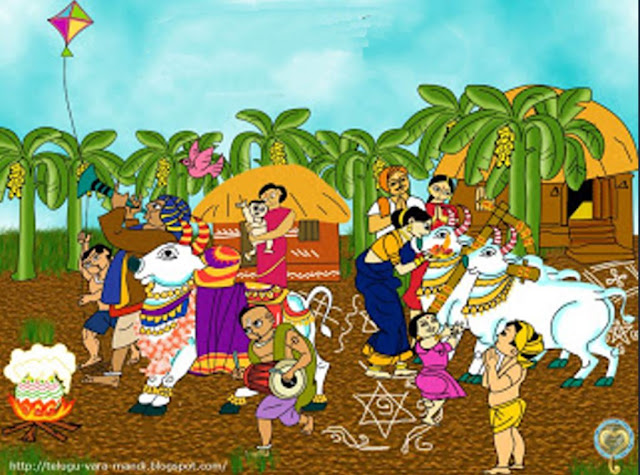 |
| Pongal/ Sankranthi, A colorful festival of India |
Pongal festival is having some inner meaning in it. This festival is mainly meant for agriculturists/Farmers. As many farmers/agriculturist are busy with their crop sowing to harvesting they find no time to spare for festivals and on the harvest. They gain plenty of money and joy of yields in this month. So they celebrate the occasion in a grand way. This festival is celebrated as Pongal along with family members, by wearing new dresses (as they can get money on yield sales) that is offering the sample of their yield by making as Pongal with sweet. Later we all celebrated this as a festival as we all hailed from the villages.
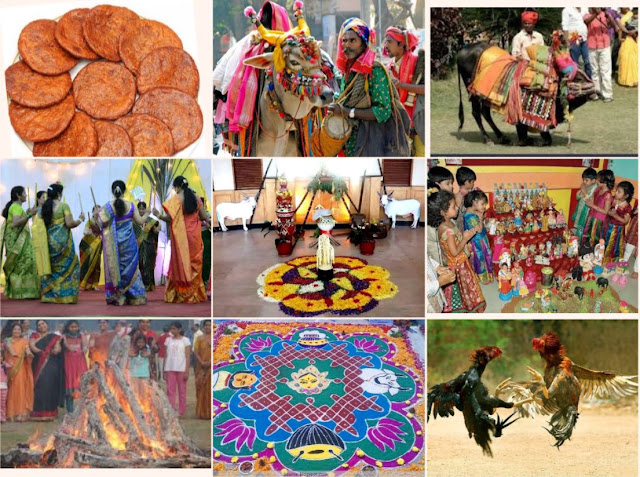 |
| Highlights of Pongal/Sankranthi Celebration |
I still remember the days we were going on a bullock cart to my grand parent's house in a village to celebrate this festival. It was one of the occasions, all my Grandparents, parents, aunties, uncles, cousins, nephews and relates unite together at one place and enjoying those festive days with the greetings , games and gifts. I do remember my grandfather bringing a lot of fresh sweeten sugarcanes from the fields to satisfy all the children and A rich Aroma of Ariselu coming out of the kitchen. I still recollect the nights we were sitting on the lawn and watching ladies filling the colors for rangolis to make them soo colorful and giving ranking to them.
The entire State is getting ready for Sankranthi celebration of rich Telugu culture and traditions, So I thought of putting all my memories in this post and give a site on how this festival is celebrated in Telugu states.
On this festival, the countryside in both the Telugu states wore a festive look with decorated houses, Rangolis, kite-flying, cockfights, bull-fights, Hari dasus, Kolatam and other rural sports and what not. Villages in both the states come alive with Sankranti, considered as one of the major festivals. It was time for the families to take a break and come together in their natives' towns and villages.
Most of the people residing in cities will go to their own villages to enjoy the occasion. For children of those settled in cities and abroad, it is an occasion to have a feel of life in the countryside. They visit the fields and participate in various rural sports. The houses were decorated with marigold flowers and mango leaves. Women folks decked the front-yard of houses with Rangoli. They set cow-dung balls called as ‘Gobbemma’ and placed among the Rangoli patterns and also put a fresh harvest of rice, turmeric, and sugarcane.
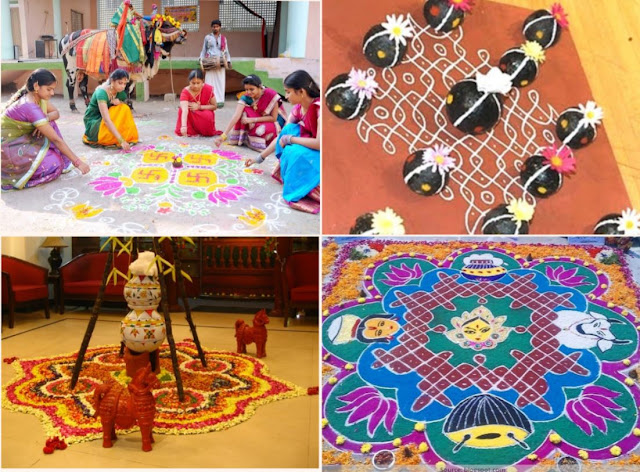 |
| Colorful Rangolis decorated with Gobbemma (Cow Dung) |
Rangoli competitions too are a common sight. The entire month from mid-December to Sankranthi is celebrated with giant rangolis in front of the house which are drawn only at late night for the entire month. For all other days of the year, rangoli is typically drawn in mornings only.
Not only Rangolis brings the attraction to the villages but also women and kids who dressed up in colorful Kanchivaram pattu sarees, half sarees and the skirts brings a lot of feast to eyes.
Also, see Some of my kanjeevaram collection
 |
| Gorgeous Ladies dressed up in Traditional attires |
Another notable feature of the festival in South India is the Haridasus who dressed up in an attire unique to the art form, with an ‘Akshaya Patra’ on the head, a ‘Tambura’, and ‘Chidatalu’, the Haridasu is the one who brings in the festive spirit associated with Sankranti. Haridasu goes from house to house and asks for bhiksha. Haridasu says “Krishnarpanam” when he receives offerings from people and wishes them good luck.
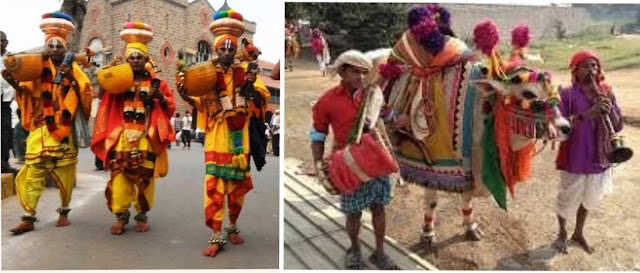 |
| Haridasu and Basavanna on Pongal |
On this vibrant and thriving Telugu festival, people play Kolatam. Kolattam is one of the most popular folk dance practiced by young women as part of fun activity in those days. It is a combination of rhythmic movements, songs, and music. People sing and dance to exhibit their elation. There are lots of popular Pongal songs that are sung on this occasion. These songs consist of the literary and artistic quality of the Telugu culture.
This festival is celebrated differently in different parts of the country. It will be celebrated for 4 days in both the States.
Day 1- Bhogi
Day 2 - SANKRANTI
Day 3 - Kanuma
Day 4 - Mukkanuma
Usually, 13th or 14th January is considered as the first day of celebrations which is known as Bhogi. On this day early in the morning people of a family or a community gather together and burn pidakalu made out of Cow dung, as well as wooden logs, paper waste, thrown out wooden goods etc. It stands for realization, transformation and purification of the self by a change for the better. After the bonfire, all the family members take Abhyangana Snanam which includes Hair and Body massage with oils followed by nalugu and hair wash with soapnuts. All the roads in villages are decorated by women with colorful rongalis, flowers and Gobemmalu. People believes that cow dung is one form of goddess Lakshmi who blesses and stay for long in the houses decorated with these cow dungs and rangoli. Haridasus’ and ‘Basavannas’, the uniquely attired alm-seekers with ornately decorated oxen, made rounds of villages to seek alms.
 |
| Bhogi Fire on Pongal |
On this evening small children up to 10 years were celebrated with 'Bhogi pandlu'. In this event, women gather in the evening in a house for 'parentum' to get rid of Dishti(drushti). Children whose age below ten years were made to sit out. The elder members of the gathering and the mother of the child pour Indian Dates (Regu pallu-Badari fruits in Telugu) along with petals of flowers, Bengal grams, paise coins over the head three times with traditional singing. All the women folk who gathered there bless the children on this occasion.
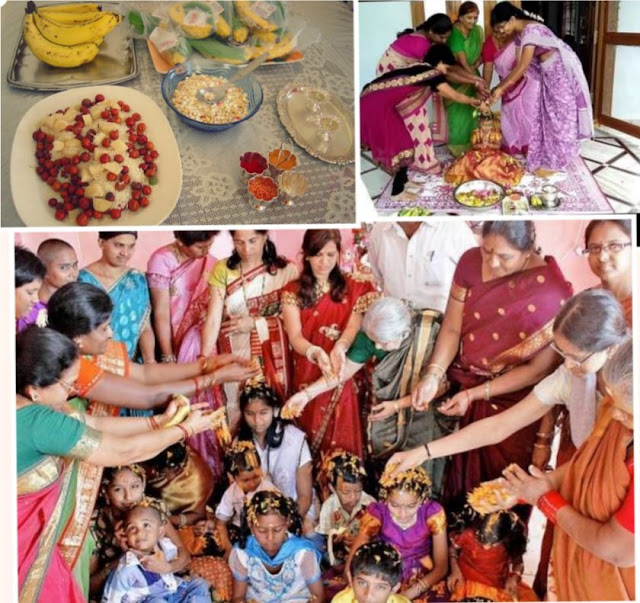 |
| Pouring Bhogi Pandlu on Pongal |
Next day to Bhogi is Makara Sankranthi the big festival of this Sankranthi sambaralu. On this day every member of the family wear new clothes and pray to their favorite God by offering them, sweets. and also make offerings of traditional food to ancestors who have died. This festival is celebrated since the planet Sun enters Makara Rasi. The women also prepare various favorite dishes like ‘chakkara pongal’ or rice kheer, a special dish made of new rice, jaggery and milk, Ariselu, a sweet made out with wet rice flour and Jaggery etc. are served.
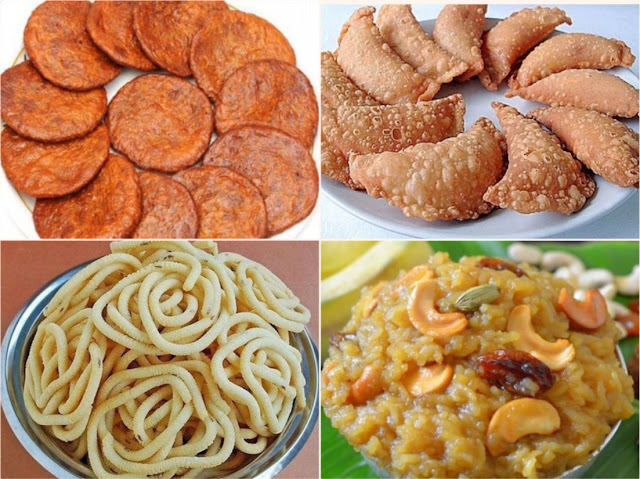 |
| Special mouth watering Dishes made on Pongal |
After Makara Sankranthi day, it is Kanuma. The farmers also decorate bullocks, cows and worshipped them for their contribution to the harvest. Despite the court orders banning cock-fights, the bloody sport was organized openly in parts of coastal Andhra. Farmers give money, gifts, and clothes to the workers of their fields. On this day the sky was dotted with colorful kites. Popular Hindi and Telugu chartbusters blared from speakers as youngsters flew the kites from rooftops.
The young damsels come together and put forward cute little dolls coupled with other things and narrate a scenario. Although this tradition of Bommala Koluvu is slowly fading, people of all ages love to see the display as friends and relatives are invited to have a look. In the olden days, local handicrafts like Kondapalli and Etikoppaka toys and dolls were showcased but new the collection of handicrafts across the country are being displayed in the schools as part of Pongal celebrations.
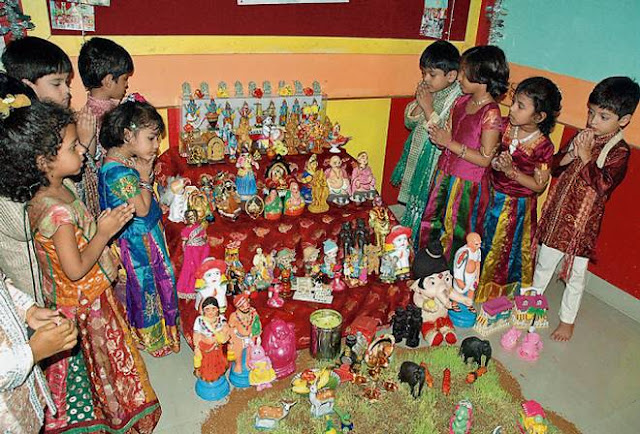 |
| Bommala Koluva on Pongal Kanuma |
Mukkanuma is the fourth day of the festival most people stay indoors and spend the day with family members. Mukkanuma is famous among the non-vegetarians of society. People do not eat any non-vegetarian during the first three days of the festival and eat it only on the day of Mukkanuma. In the evening at a commonplace of the village bull race, Cockfights, Rangoli competition for women and other local games or sports are organized and prizes will be distributed for the winners.
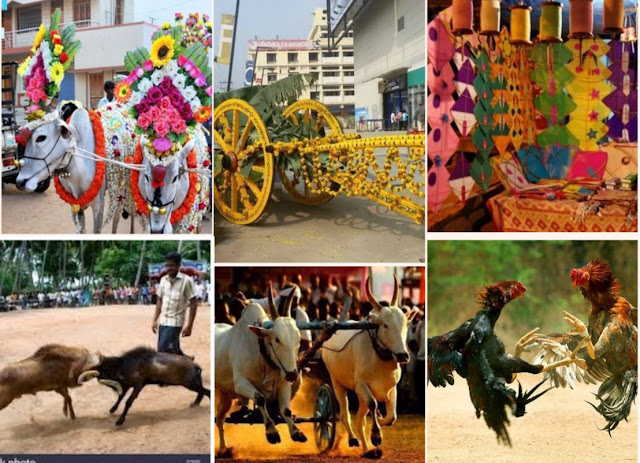 |
| Bull Race, Kite Fly, Big Horn Sheep Fight and Cockfights on Pongal |
These are the some of interesting and exciting events of Telugu Sankranti.
So, Let's take our steps to save our great culture and traditions by celebrating our festivals and encourage our children to get aware of all our festivals and let them also taste the joy of that we experienced.
I wish to know from you all how this festival is celebrated in your regions. I hope you also recollect all your sweet memories of this festival.
Also see #DupattaDrapes #Lehenga #Kurta #Sarees #BlouseDesigns #Jewelry
Mom&Me Matching Outfits
Nice one
ReplyDeleteI heard from one of my friends, they worship the god, Surya Idol.
ReplyDelete